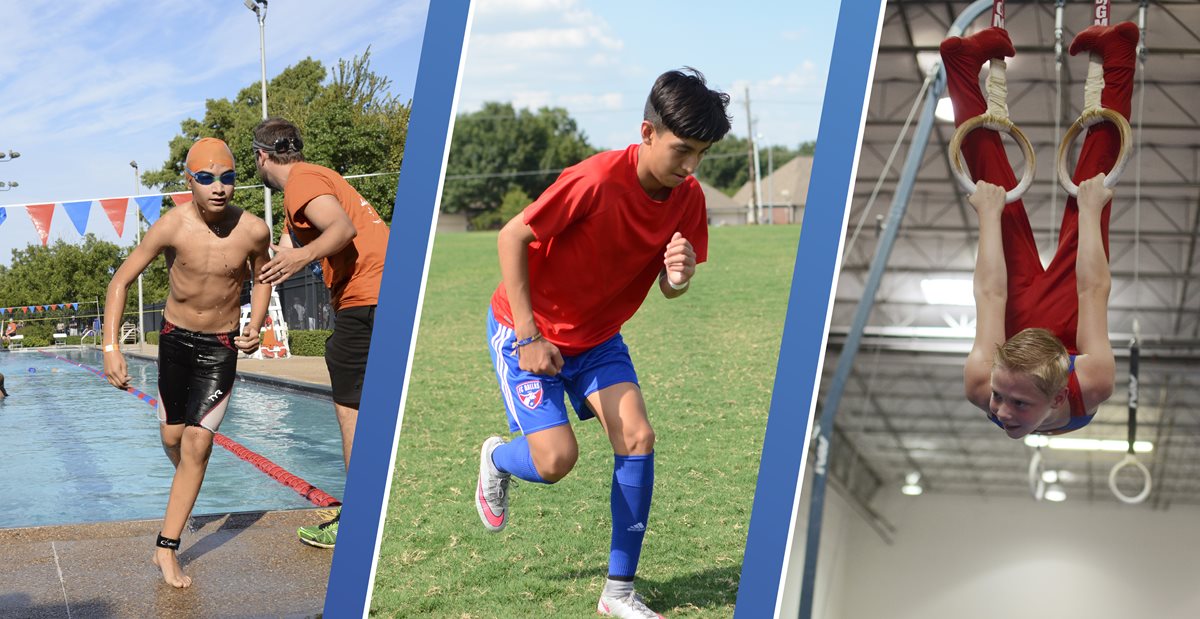Research around the athlete triad has focused mainly on female athletes. However, there is growing evidence that males experience a syndrome similar to female athlete triad.
What is male athlete triad?
Male athlete triad can be seen in physically active young men and boys. It is made up of three components that are related to each other:
- Low or deficient energy availability
- Reproductive suppression
- Poor bone health (low bone mineral density)
It occurs when energy intake (consuming calories) and expenditure (training or competing) are imbalanced. The athlete does not have enough energy available to meet the demands of their training and carry out normal body functions.
The male athletes at highest risk for the male athlete triad are those who participate in endurance sports that emphasize leanness like cross country, gymnastics, figure skating, diving and cycling, and those who participate in weight class sports like rowing and wrestling. Those who exercise excessively in addition to their regular practices are especially at increased risk. Symptoms of the triad can also present in any male athletes who are unhappy with their body image and who may, therefore, engage in unhealthy eating practices like skipping meals, excluding food groups or “extreme” weight control behaviors.
All three components of the triad do not have to be present to cause negative health consequences. Because these components are interrelated, if one is present, further evaluation is recommended. Early intervention is key to preventing further progression of the triad.
“This condition has typically been associated with girls in sports that emphasize physique and leanness,” pediatric sports medicine physician Jane S. Chung, M.D., says. “In recent years, there has been an increased focus on understanding how this affects boys as well.” In 2021, the Female and Male Athlete Triad Coalition published the first consensus statement addressing male athlete triad. “This step forward is important and is helping us raise awareness about how we need to look for signs of under-fueling in all young athletes,” says Chung, a member of the coalition.
Chung sees patients with certified sports dietitian Taylor Morrison, R.D., CSSD, L.D., in a monthly clinic. “This clinic was designed to address the big picture and evaluate young athletes who are at risk or concern for under-fueling and low energy availability, putting them at risk for the female or male athlete triad,” Chung says. “We aim to address the necessity of balance between training, nutrition, rest and recovery.”
Call 469-515-7100 to schedule an appointment in the sports medicine clinic to discuss energy availability with Chung and Morrison.
Morrison frequently teaches healthy and injured athletes about appropriate ways to fuel before, during and after sports. “Growing teenage boys need a lot of calories along with specific nutrients to meet the demands of growth, development and training and they may not realize how important this is for their overall health as well as their performance,” she says. “They are often surprised to learn how much food and the types of food they need to meet their sport-related goals and protect their bodies from injuries.”
What causes male athlete triad?
This condition is caused by not consuming enough calories to restore what the body uses, or under-fueling, particularly around demanding workouts and physical activity.
How is male athlete triad diagnosed?
Male athlete triad and the individual components can be diagnosed by a physician and may include blood work, X-rays or other medical tests.
How do the components affect overall health and performance?
Each of the three components is on a spectrum of severity, from very healthy to very unhealthy.
LOW ENERGY AVAILABILITY OR ENERGY DEFICIENCY
Each athlete has personal nutrition needs for healthy growth, development, training and competition.
- An athlete may limit food intake intentionally or unintentionally, causing an imbalance of calories used and calories consumed.
- Poor eating habits and under-fueling can affect normal body processes.
- This can lead to decreased performance when an athlete is trying to improve performance.
HORMONE SUPPRESSION OR REPRODUCTIVE SUPPRESSION
Testosterone is a hormone that plays an important role in male reproductive, bone and muscle health as well as mood and emotional health. Young males who are very lean, participate in high-volume training and under-fuel are at risk of expending more calories than they consume, causing an energy deficit in the body. This can lead to decreased testosterone levels, which may cause hormonal imbalance in the male body, negative effects on the male reproductive system, moodiness, thinning of hair or unintentional weight gain.
POOR BONE HEALTH
During adolescence, athletes are in an important phase of growth and development, achieving more than 90 percent of their peak bone mass during this time.
Under-fueling often leads to additional nutrient deficits, including calcium and vitamin D, two important nutrients for building strong bones. Inadequate calcium and vitamin D intake puts athletes at risk for developing low bone mineral density and bone injuries, such as stress fractures. Stress fractures are small breaks in the bone that are painful, difficult to detect and often require prolonged time out of sports. Meeting daily energy needs and getting enough calcium and vitamin D are all essential for building strong bones in teen athletes.
How is male athlete triad treated?
This condition requires an individualized and multifaceted treatment plan.
- Early recognition and prevention of complications are important for long-term bone health and overall wellness.
- The focus of treatment for this condition is to increase the number of calories, or food and drink consumption, so the athlete has enough energy available to meet the needs of sport, training and health.
- The treatment team typically involves a psychologist and a sports dietitian.
Are there warning signs to watch for?
If you notice these signs in your young athlete, consult with a medical provider:
- Extreme weight loss or excessive worry about weight
- Recurrent stress injuries of the bones, such as stress reaction or stress fractures
- Restrictive or unusual eating behaviors
- Obsession with exercise/working out
Making sports nutrition a priority for all young athletes is important. It is especially critical for athletes with signs and symptoms of the triad. Contact our clinic to schedule an appointment for an evaluation if you are interested in a visit to discuss our concerns.
Email [email protected] or call 469-515-7100.














